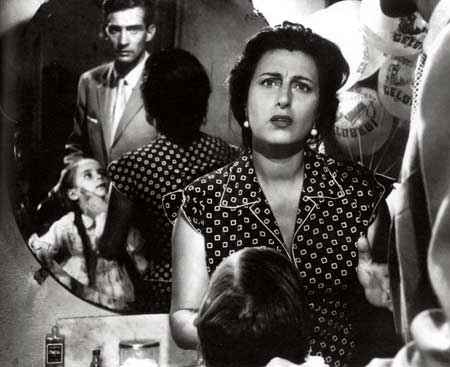From the Chicago Reader (May 1, 1989). — J.R.

Perhaps the most unjustly neglected of Luchino Visconti’s early films is this hilarious 1951 comedy, tailored to the talents of Anna Magnani, about a working-class woman who is determined to get her plain seven-year-old daughter into movies. A wonderful send-up of the Italian film industry and the illusions that it fosters, delineated in near-epic proportions with style and brio. With Walter Chiari and Alessandro Blasetti. (JR) Read more
This was written in the summer of 2000 for a coffee-table book edited by Geoff Andrew that was published the following year, Film: The Critics’ Choice (New York: Billboard Books). — J.R.

There’s something approaching a consensus, shared by the filmmaker himself, that the best of Claude Chabrol’s early features is Les bonnes femmes (1960), his fourth. Yet the film was a box office flop when it first appeared, widely attacked in France and elsewhere for being ugly, misanthropic, and cynical. And it might be fair to say that this response wasn’t so much superseded as reinterpreted in the years to come. For Les bonnes femmes is probably Chabrol’s most pessimistic work, harping relentlessly on vulgarity, boorishness, and cruelty. Focusing on four young woman who work from nine to seven at an electrical appliance store in Paris, the film offers a definitive look at what they want from life and how poorly they fare in their aspirations — culminating in a remarkable, ambiguous final sequence set in a dancehall, leaving everything up to the audience’s troubled imagination, about another young woman who isn’t identified at all dancing with an equally unidentified stranger.
Jane (Bernadette Lafont), the shopgirl who visibly expects the least from life, goes out carousing with a couple of men in an early sequence and virtually gets raped. Read more


